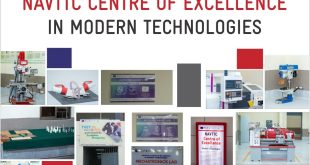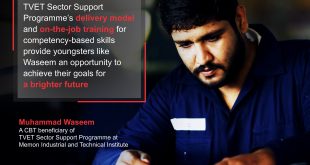Muhammad N awaz alias Aashee is a transgender and she lives in Green Town, Lahore. Born in Gujrat, she moved to Lahore 20 years ago with her guru (mentor). It had been an escape from a life of constant degradation and rejection. At home, her family did not want to be associated with a transgender. At the boys’ school where she did her Matriculation, her classfellows subjected her to constant ridicule and abuse, and even the teachers would hold her responsible for the conflicts and advise her to “mend her ways.”
awaz alias Aashee is a transgender and she lives in Green Town, Lahore. Born in Gujrat, she moved to Lahore 20 years ago with her guru (mentor). It had been an escape from a life of constant degradation and rejection. At home, her family did not want to be associated with a transgender. At the boys’ school where she did her Matriculation, her classfellows subjected her to constant ridicule and abuse, and even the teachers would hold her responsible for the conflicts and advise her to “mend her ways.”
“Only a transgender can know the ordeal they have to go through throughout their lives,” she says.
The option of making ends meet through singing and dancing at festive occasions, which she used to do in her younger days, is no longer open to her at the age of 41. Instead, she relies on alms money, assistance from well-earning members of her community, and charity distributed at the shrines of Sufi saints to eke out a living in her rented house, which she shares with two others of her community.
“I have always despised a life of dependency,” she laments. “I tried my best to break these shackles but couldn’t succeed.”
That is, until she met Master Taj, a transgender well-known for her tailoring skills, who told her about a training course in industrial garments stitching (IGS). Aashee jumped at the opportunity; and today, she “is one of the most committed students in the class,” reports Munir Rajput, the Admission and Placement Officer at the Vocational Training Institute (VTI) in Green Town, which is managed by the Punjab Vocational Training Council.
The training c ourse is being offered with the backing of the Fund for Innovative Training, an initiative of the Technical and Vocational Education and Training Reform Support Programme. This is a multi-lateral initiative co-funded by the European Union, the Embassy of the Kingdom of the Netherlands, and the Federal Republic of Germany and is being implemented in Pakistan by the GIZ.
ourse is being offered with the backing of the Fund for Innovative Training, an initiative of the Technical and Vocational Education and Training Reform Support Programme. This is a multi-lateral initiative co-funded by the European Union, the Embassy of the Kingdom of the Netherlands, and the Federal Republic of Germany and is being implemented in Pakistan by the GIZ.
Under this programme, the VTI is offering IGS courses to a batch of deserving women and members of the marginalized transgenders’ community. They are being trained free of cost, provided free uniforms, and given a stipend of Rs. 2,000 every month. In total, 24 transgenders and 36 female trainees have been enrolled in the course. There were only four dropouts – all from the former group who could not continue due to personal reasons. “It took us two months to convince transgenders to apply for the course,” Munir relates. “Many of them make good money from activities which are not approved of by society and would scoff at what we had to offer.” He says that the older and not-so-good-looking ones were the first to apply. Eventually, even some of the younger and prettier ones realized that their patrons would not look after their financial needs forever, and they came round.

“We launched the IGS course as this profession is in high demand and there are a large number of textile units in the vicinity of the VTI,” explains Munir, adding that a few factories had already expressed their interest in hiring transgenders once they graduated. Ayesha Ejaz, a young girl in her early 20s, is a beneficiary whose father is a helper in a hospital. She stitches clothes at home but once she graduates she hopes to earn good money. “I have learnt this trade on brand new imported machines which aren’t available at private training centers,” she says. “I was told by a female employee of a stitching unit that having prior knowledge of operating these machines increases one’s chances of employment.”
Chandni Jameel, a mother of two, is hopeful that her employability will increase manifold due to the skills she has attained. Her husband is a security guard who earns a paltry Rs. 9,000 and she wants to help supplement their income. “Multi-tasking is the key to finding a good job,” Chandni observes. “Industrial employers want prospective employees to be well-versed in the complete production cycle. I feel confident as I have learnt all the major trades in this field during our training.” Munir seconds Chandni’s statement.
 “We have formulated our labs according to industry standards,” he elaborates. “The teachers are experienced and have close contacts with the major industries.” This led the staff to take orders from several established stitching units such as Nishat, Tex Pak, and Comfort Knitwear among others, and have the students develop samples for them. The technique was a tremendous success. “Our trainees got job offers from these firms,” Munir reveals. “They will join them soon after the completion of their trainings.”
“We have formulated our labs according to industry standards,” he elaborates. “The teachers are experienced and have close contacts with the major industries.” This led the staff to take orders from several established stitching units such as Nishat, Tex Pak, and Comfort Knitwear among others, and have the students develop samples for them. The technique was a tremendous success. “Our trainees got job offers from these firms,” Munir reveals. “They will join them soon after the completion of their trainings.”
Jasmine, a transgender, also stands a good chance of finding a job via this VTI-industry alliance. It would come as a great relief to her. She has a small piece of land inherited from her parents but it is under the constant threat of being snatched away by her estranged siblings. “I don’t have the words to thank all those at the VTI and all those who have supported this programme,” Jasime says. “They cared for me and other neglected ones like me.” According to Munir, it’s not only the transgender community that will benefit from these employment opportunities, but the industry also. He feels that the transgenders’ inability to switch jobs actually makes them more dependable employees. Furthermore, “they have a high IQ,” he says; and adds, “They have no family obligations to fulfill, so their focus will primarily be on their work.” It is a persuasive argument – and one that will be given a much-needed chance to be realized through this scheme.
 Pakistan TVET REFORM Support Programme Technical and Vocational Education and Training (TVET) Reform support Programme
Pakistan TVET REFORM Support Programme Technical and Vocational Education and Training (TVET) Reform support Programme









